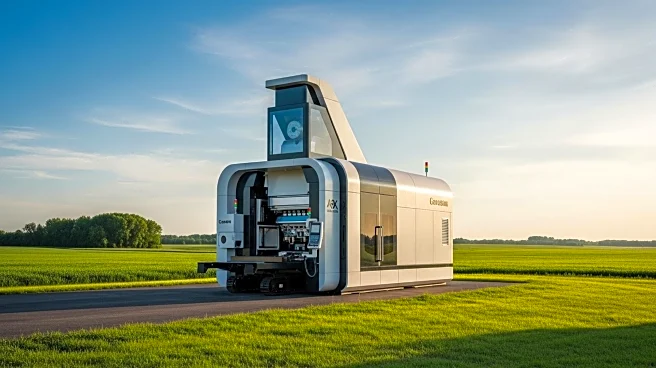What's Happening?
The Business Record recently hosted its annual Manufacturing Forecast event, focusing on the economic health of Iowa's manufacturing sector. Key panelists included Nicole Crain from the Iowa Association of Business and Industry, Ernie Goss from Creighton University, Matt Koch from Sukup Manufacturing, and Peter Orazem from Iowa State University. The discussion highlighted several pressing issues, such as the impact of tariffs, workforce shortages, and the potential for micro-manufacturing in rural areas. Orazem noted the challenges rural areas face in attracting manufacturing due to the lack of agglomeration economies, which are more prevalent in urban settings. The event also addressed the loss of manufacturing jobs in Iowa since the pandemic, primarily in durable goods related to agricultural equipment, and the potential for these jobs to return with an agricultural economic upturn.
Why It's Important?
The manufacturing sector is a critical component of Iowa's economy, and its challenges reflect broader national trends. The discussion on rural manufacturing opportunities is significant as it highlights the potential for economic revitalization in smaller towns, which could benefit from lower costs and available infrastructure. However, the sector faces hurdles such as trade tensions and labor shortages, which could impact its growth and sustainability. The insights from the panelists suggest that while there are opportunities for growth, strategic policy interventions and investments are necessary to overcome these challenges. This could include leveraging Iowa's comparative advantage in energy production and exploring state-level immigration policies to support workforce development.
What's Next?
Future steps may involve exploring policy changes to facilitate micro-manufacturing in rural areas and addressing workforce shortages through immigration reforms. The potential for tariff adjustments under future administrations could also impact the sector's trajectory. Stakeholders might focus on creating favorable conditions for manufacturing growth, such as improving access to the H1B visa program for small firms and considering state-sponsored refugee programs to bolster the workforce.
Beyond the Headlines
The discussion also touches on the ethical and economic implications of trade policies and their uneven impact across sectors. The potential for rural revitalization through manufacturing could lead to long-term shifts in demographic and economic patterns, potentially reversing the trend of urban concentration. Additionally, the focus on energy efficiency and sustainability in manufacturing could align with broader environmental goals, offering a dual benefit of economic and ecological advancement.









